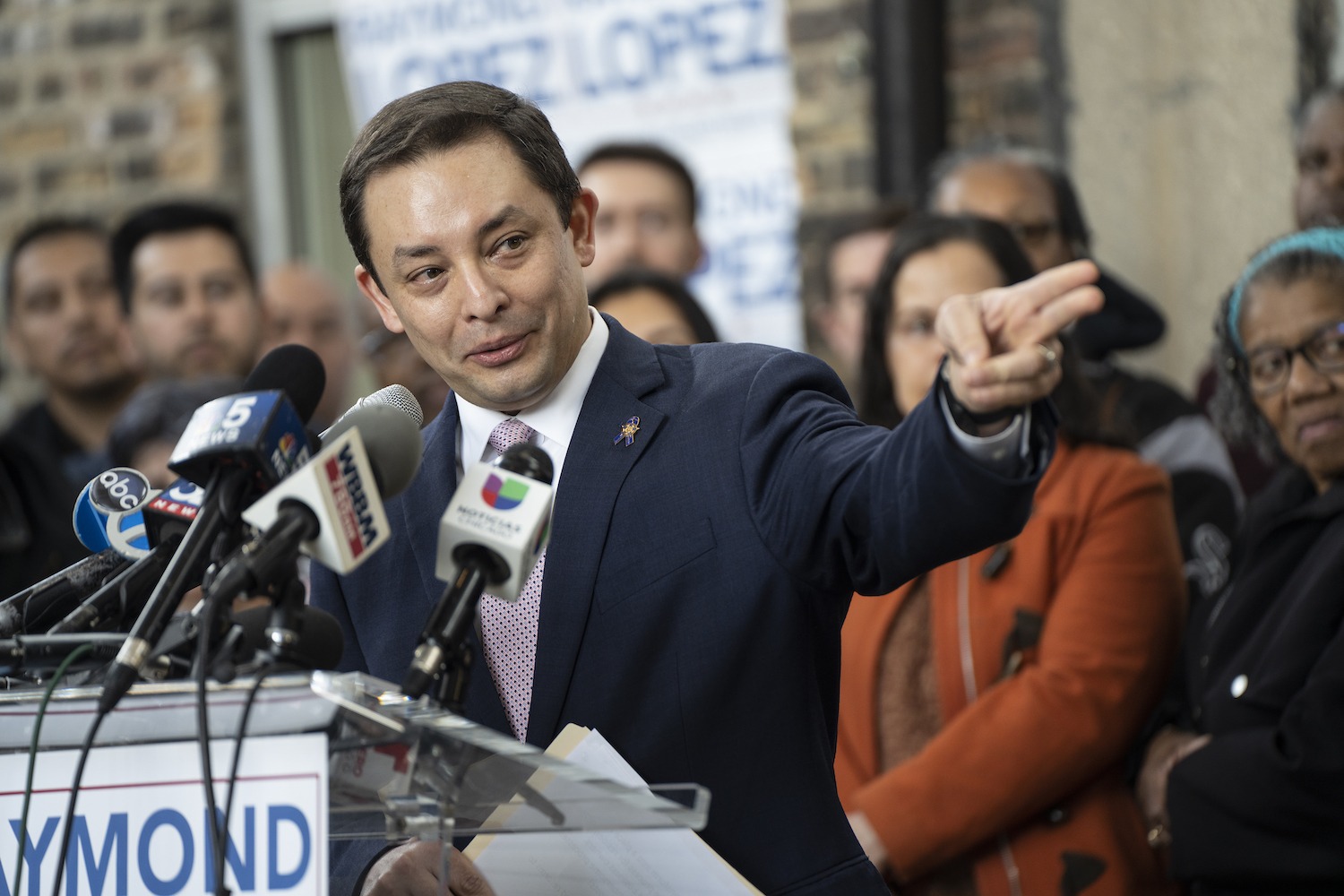The late Mike Royko once called the alderman “the lowest form of political life.” Many Chicagoans would agree, given their propensity for ending up in prison. Every once in a while, though, an alderman attempts to evolve into a higher form of political life, such as a mayor.
On Wednesday, 15th Ward Ald. Raymond Lopez announced his candidacy for mayor with a three-word tweet: “Chicago: I’m in!” Lopez is one of five alders being talked about as mayoral candidates. The others are Brian Hopkins (2nd), Sophia King (4th), Roderick Sawyer (6th), and Anthony Beale (9th).
However, the leap from alderman to mayor may be too many steps up the food chain for any politician to make in a single election. The last to achieve it was 12th Ward Ald. Monroe Heath, in 1876. Chicago wasn’t such a big city then, and being mayor wasn’t such a big job. (I would like to say that Heath made the move from the 2nd floor to the 5th floor, but the current City Hall hadn’t been built yet.) Heath served a one-year term, followed by a two-year term, under a new city charter. Heath was mayor during the violent 1877 railroad strike, during which he encouraged Chicagoans to form vigilante groups to defend the city against strikers. Another memorable event during his administration was the “Sign War.” Heath ordered the police to take down hundreds of hanging signs, because they violated an ordinance against street obstructions. In response, the City Council amended the ordinance to permit the signs.
“[T]he mayor was requested to withhold the removal of the signs, but prior to this action many signs had been removed by bodies of police, and many street encounters and much excitement was the result,” wrote A.T. Andreas in his History of Chicago: From the fire of 1871 until 1885.
(George Bell Swift was elected mayor in 1895, after serving on the Council, but he had previously served a short term as mayor, appointed after the assassination of Carter Harrison Sr., so he was more than a mere alderman.)
In the modern era, a few aldermen have tried to follow Heath’s path to the mayor’s office. In 1955, 5th Ward Ald. Robert Merriam was the Republican nominee against Richard M. Daley. You only recognize one of those names. Twenty years later, the Council’s lone Republican, John Hoellen, challenged Daley. He won 19.9 percent of the vote. In 1977, after Daley died, Ald. Roman Pucinski ran in the Democratic primary for the special election to finish the Old Man’s term. He lost to the sitting mayor, Michael Bilandic. The last alderman to run for mayor was Edward Vrdolyak, in 1987. Vrdolyak was one of the “Three Eddies” who led the white ethnic opposition to Mayor Harold Washington. Fast Eddie thought he could do a better job as mayor, or at least a whiter one. The voters disagreed, handing him a 55 percent to 42 percent defeat.
There are several reasons Heath’s feat has not been repeated in 146 years.
- Aldermen have to give up their seats to run for mayor. Alderman is a pretty good job. It pays $130,000 a year. That’s in the top 10 percent of incomes. Ed Burke has been doing it for 53 years, and has supplemented his salary by collecting millions of dollars in legal fees from property owners who want to do business with an alderman.
- A ward only covers 2 percent of the city. That’s not a big political base, and voters don’t think alderman is a big enough job to prepare for running the other 98 percent of the city. Nobody even knows where Brian Hopkins’s ward is located, including the people who live in it.
- The aldermen who have run for mayor in recent years have done so as opponents of the sitting mayor. Lopez fits that profile. The mayor’s biggest nag on the Council, he has criticized her for running “a very tumultuous administration,” and “not building any bridges as a leader.” Coming from a position like that requires an alderman to run a querulous, negative campaign.
- Aldermen are seen as shady. Since 1973, more than 30 aldermen have been convicted of corruption. Just this year, Ricardo Munoz was sentenced to 13 months in prison for skimming money from the Council’s Progressive Caucus, and Patrick Daley Thompson was forced to resign his seat as a result of a felony conviction for filing false income tax returns. Carrie Austin is awaiting trial for bribery, while Ed Burke is up for bribery, racketeering, and extortion.
Then again, our current mayor was only head of the police board. If someone like that can get elected mayor, why can’t an alderman? That must be what they’re thinking on the City Council.
Related Content



